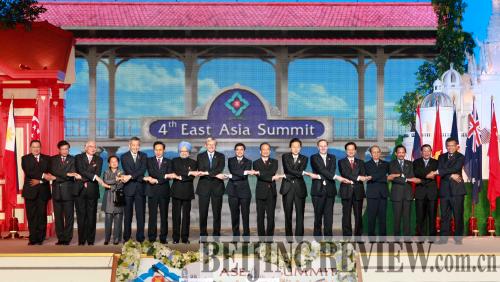|
 |
|
JOINING HANDS: Leaders participating in the fourth East Asia summit pose for a group photo in Hua Hin, Thailand, on October 24 (PANG XINGLEI) |
From October 23 to 25, Chinese Premier Wen Jiabao attended the 12th China-ASEAN (Association of Southeast Asian Nations) summit, the 12th ASEAN Plus Three summit and the fourth East Asia summit in Hua Hin, Thailand.
In conclusion, Foreign Minister Yang Jiechi noted that the Chinese Premier was instrumental in helping ensure the success of the ASEAN summits.
During these meetings, Wen offered suggestions on fighting the financial crisis by enhancing regional cooperation. The premier's ideas addressed both the immediate and urgent issues of common concern while taking into account long-term strategic planning, Yang said.
"These proposals fully indicated China's goodwill, sincerity, and its confidence and willingness for cooperation," he said.
The foreign minister specified China's achievements during the visit in the following three aspects:
First, actual cooperation between China and its ASEAN partners has deepened. Since 1991, Beijing and ASEAN set up close trade, economic and political relations, complemented by mutual trust and cultural exchanges. Both sides have since confirmed a number of key cooperative fields, including agriculture and telecommunications, and conducted practical cooperation in nearly 30 fields. And completion of the China-ASEAN free trade area (FTA) is expected by 2010.
At the China-ASEAN summit, the Chinese Premier vowed to boost bilateral cooperation in several fields: making the most of the China-ASEAN FTA to advance bilateral relations on all fronts; increasing Chinese investment in ASEAN members; protecting intellectual property rights; and eliminating trade barriers.
Other proposals include accelerating infrastructure construction; deepening agricultural cooperation; and helping ASEAN members increase food productivity. Beijing also plans to assist ASEAN in environmental protection and the use of clean energy. In this regard, China plans to train 100 government officials on environmental protection strategies for ASEAN over the next three years.
In terms of promoting regional health, China hopes to work together with ASEAN on A/H1N1 flu prevention. Cooperation will also be extended to the areas of defense, culture, education, tourism and cracking down on cross-border crime.
In April, Wen declared the Chinese Government would establish a $10 billion China-ASEAN Fund on Investment Cooperation to support infrastructure development in the region. Beijing, he added, also planned to offer $15 billion in loans to ASEAN countries and 270 million yuan ($39.5 million) in special aid to less developed ASEAN economies. In Hua Hin, Wen said the China-ASEAN fund would become available by the end of this year.
Meanwhile, China voiced support for full ASEAN integration and its leading role in regional cooperation.
Second, China has contributed to deepening regional cooperation among East Asian nations. "China is among the first countries to support cooperation among East Asian nations," said Yang.
Wen noted the large populations, diverse cultures and varied levels of development shared by East Asian nations, in addition to diverse cooperation mechanisms.
Nonetheless, he urged countries in East Asia to safeguard common ground via sustainable ties that can preserve ongoing regional economic and social development.
Wen noted during the ASEAN Plus Three summit that the ASEAN Plus Three cooperation should consider the global financial crisis as its most urgent task.
He further proposed that the road to economic recovery among East Asian nations lies in structuring financial and monetary policies with which to stimulate economic growth and overall stability.
Countries in the region, added Wen, should further deepen financial ties by constructing regional foreign exchange reserves and institutions that may implement regional economic surveillance.
Wen further hinted he hoped the Chiang Mai Initiative Multilateralization, a $120 billion regional reserve pool aimed at providing emergency liquidity for countries in financial crisis, could be launched by the end of this year. China, he added, is willing to offer $200 million to the region's credit guarantee and investment fund.
| 